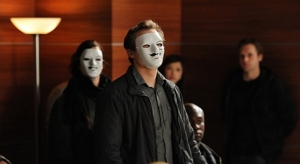 Something happened on Sunday that shook me up, as it seemed to mark a change or shift in the way the world operates that is deeply unsettling.
Something happened on Sunday that shook me up, as it seemed to mark a change or shift in the way the world operates that is deeply unsettling.
A number of people were posting on Facebook about the suicide of Canadian 17-year-old Rehtaeh Parsons after she was raped and subsequently bullied. Some of the posts focused on the work of Anonymous, an unorganized international group of “hacktavists” who claim they were able to find out the identity of two of four of Rehtaeh’s rapists in two hours and will soon know the other identities as well. As we all know, there is an incredible amount of information about crimes on the internet since idiots, particularly teen idiots, are unable to keep from bragging and posting photos of what they do.
I’m familiar with the role played by a blogger in drawing attention to online evidence about the rape of a teenager in Steubenville, Ohio, which ultimately led to a conviction of a local football player. I thought this might be similar.
One of my Facebook friends posted a link to a video made by Anonymous about the Rehtaeh Parsons case. While watching it, I got chills up my spine. It is the video that unnerved me.
It has what I can only call “high performative values.” It is crafted to look like a futuristic news announcement, the kind that might break in on television sets in Gotham during the plot of a Batman movie, with an arch-villain, though in this case an arch-vigilante, in a mask making a computer-generated voice announcement and demands. Here, from Youtube, is the video:
I had to keep telling myself “this is real,” while watching it, and also in my brain I kept saying, “What does this mean?” What does it mean about our culture, about justice, about reality and virtual reality?
That very same night, my favorite show on television, The Good Wife, played out an eerily simliar scenario (clearly modeled on the Steubenville case). On the show, the firm represents a rape victim and begins to receive evidence from Anonymous. Members of Anonymous even show up in the courtroom, demanding justice. Although the lawyers can “confirm and validate” the photographic and video evidence, it is not allowed in the trial because it was obtained improperly.
 On the show, the question seems to be: “Did Anonymous do more harm than good?” in disrupting the trial, which the victim was losing due to lack of evidence, OR, “Did Anonymous do exactly what was called for by publicizing the truth online?” The case was a civil trial and what the victim wanted more than anything was an acknowledgment of what happened to her, public shaming of the rapist, and that, in the end, is what she got.
On the show, the question seems to be: “Did Anonymous do more harm than good?” in disrupting the trial, which the victim was losing due to lack of evidence, OR, “Did Anonymous do exactly what was called for by publicizing the truth online?” The case was a civil trial and what the victim wanted more than anything was an acknowledgment of what happened to her, public shaming of the rapist, and that, in the end, is what she got.
In the case of Rehtaeh Parsons and her Anonymous, I can’t find my way past the problems I have with the medium. What does it mean to perform this dystopian vision using real information and real people? What does it mean that the bullying and shaming that led to Rehtaeh’s death was also online, and now this sort of justice by terroristic-style threat is happening online?
When I read George Orwell’s 1984, I wasn’t afraid. It was 1980, and Communist tyranny had lost its teeth. Nor was I afraid watching Blade Runner or Brazil or, for that matter, Batman or Spiderman. The dystopic future represented in those fictions seemed very unreal. The questions about the nature of humanity were gripping, and could be explored in the safe space provided by the genre.
Sometimes when I watch Jon Stewart’s show I am uncomfortable, especially when he has to keep insisting “We’re a comedy show, not a news show.” Particularly when they mock-interview or expose/shame real people in their 60 Minutes style interview “comedy” segments. In fact, Jon Stewart is taking a leave of absence to make a film that tells the story of Maziar Bahari. Mr. Bahari was actually jailed in Iran as a spy and the “evidence” was one of these comedy segments with Jason Jones. You could say he was irreparably harmed by this performative blurring due in large part to our sophistication with video narrative.
When I watched the Anonymous video, I was not just uncomfortable. I was afraid. I’m not ready for this. I don’t want to see my present on that screen.



We do not forgive. We do not forget. -eu twhytbs-
Great post.